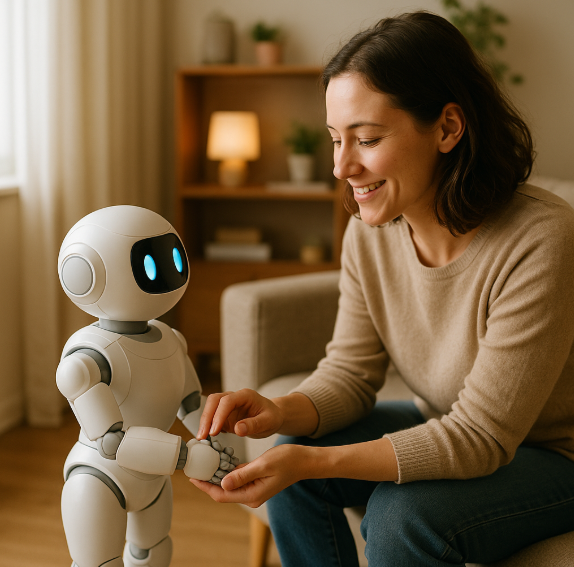Table of Contents
We’re Already Living With AI — Even If We Don’t Notice It
I don’t remember exactly when I stopped thinking of AI as “technology” and started seeing it as part of my daily life. It just… happened quietly.
At first, it was small things Netflix predicting what I wanted to watch before I even searched for it, or my phone automatically sorting my photos by face. Then came voice assistants, and suddenly, I was asking Alexa about the weather instead of checking my phone.
It’s strange how normal it all feels now. I don’t think of AI as robots taking over the world I think of it as the helpful voice that sets my alarms, the algorithm that picks the right song when I’m driving home at night, or the chatbot that refunds me when my order goes missing.
Somehow, without a grand announcement, AI moved in with us and most of us didn’t even realize it.
My First Real Chat With AI
I still remember the first time I chatted with an AI. It was years ago, on a customer service site. The bot was slow and awkward I could tell it wasn’t human. I kept typing full sentences, hoping it would “get me,” but it just repeated scripted answers. I remember laughing and thinking, yeah, robots aren’t replacing anyone soon.
Fast forward to today, and I barely notice the difference between chatting with a person or a bot online. They greet me by name, pick up where I left off, even apologize if something goes wrong. Sometimes, I forget it’s not a person until the end of the conversation.
And honestly? I kind of love it.
It’s not that I prefer machines to humans, but there’s something oddly comforting about knowing I can ask for help anytime no hold music, no waiting. Just instant support, whenever I need it.
That Voice in the Room
Then there’s Alexa or Siri, or Google Assistant whichever name lives in your house.
I still find it funny how normal it is to talk to a device. Years ago, I would’ve felt ridiculous saying, “Hey Google, play some jazz.” Now, I don’t even think twice.
My mornings start with a conversation: “What’s the weather like?” “Remind me to call Dad.” “Turn on the lights.” It’s not just convenience; it feels like rhythm. These little exchanges have become part of my routine, like brushing my teeth or making coffee.
I remember once asking Alexa to play something “happy but chill” after a long day and she nailed it. I sat there smiling, realizing I’d just shared a mood with artificial intelligence.
We talk about AI like it’s distant and mechanical, but the truth is, it’s been quietly learning how to fit into our moods, our homes, and our lives.
AI at Work: The Coworker That Never Sleeps
At work, AI is the quiet teammate I rely on more than I admit.
It reminds me of deadlines, filters spam, summarizes long documents, and helps me brainstorm ideas when I’m stuck. Sometimes, I feel like I’m collaborating with something invisible something that’s always there, working in the background so I can focus on the creative parts of my job.
It doesn’t complain. It doesn’t get tired. It doesn’t forget.
I used to worry that AI would replace people. But I’ve realized something it doesn’t replace our humanity. It amplifies it. It takes care of the repetitive, mind-numbing stuff so we can do what humans do best dream, create, connect.
Shopping, But Smarter
I’ll admit online shopping feels eerily personal these days. The ads I see are a little too accurate. I once looked at a pair of sneakers and saw them following me across every site for a week. At first, it felt invasive. Now, I see it differently.
AI doesn’t just sell me things it understands me.
It knows I love coffee gadgets, minimalist home decor, and cozy sweaters. Netflix recommends the kind of movies I actually like, not random ones. Spotify’s “Discover Weekly” playlist is so spot-on it feels like it knows my mood before I do.
Sometimes I wonder is AI shaping my taste, or just reflecting it? Either way, it’s strangely intimate. The line between “tech” and “personal” keeps blurring.
AI That Heals and Helps
One area where AI genuinely humbles me is healthcare.
A friend of mine was recently diagnosed with a condition that was caught early not by a doctor, but by an AI system that flagged something in her test results. That technology literally saved her life.
Then there’s the small stuff we take for granted. My smartwatch tracks my sleep, heart rate, and stress levels. It tells me when to stand, when to rest, when I’m pushing too hard. It’s like having a personal health coach one that never forgets to care about me, even when I forget to care about myself.
That’s what I love about this side of AI it’s not about convenience anymore. It’s about care.
The Day I Met a Robot
A few months ago, I visited a tech fair and met my first real personal robot. It wasn’t the cold, metal kind you see in movies it was small, round, and had a friendly digital face that smiled when I waved.
It could talk, follow me around, and even bring me water. But what caught me off guard wasn’t what it did it was how it made me feel.
It wasn’t “technology” to me in that moment. It felt like a little companion.
I stood there thinking, this is it this is how it starts. Not with robots taking over the world, but with simple, helpful machines that make us feel seen, heard, and supported.
Personal robots are already cleaning our homes, assisting the elderly, and offering emotional support to people living alone. They don’t just complete tasks they fill gaps. The quiet ones. The human ones.
Creativity With a Digital Partner
As someone who writes and creates, I used to be skeptical about AI in art. “Machines can’t be creative,” I told myself. But I’ve changed my mind.
AI can’t feel emotions the way we do, but it can inspire them. I’ve seen AI tools generate music that gives me goosebumps and paintings that look like dreams turned into color.
I even used an AI writing assistant once to brainstorm story ideas. I expected cold, robotic text instead, I got suggestions that made me think, wow, I never would’ve thought of that.
AI doesn’t replace creativity; it expands it. It challenges us to imagine in new directions. It’s not the artist it’s the muse.
AI in the Classroom
When I visit my younger cousins, I notice something: they’re growing up with AI in ways we never did. Their learning apps talk back to them, explain mistakes gently, and adjust based on how quickly they understand something.
They don’t see it as “AI.” To them, it’s just normal like having a personal tutor that’s always patient.
I think about how different my schooling experience would’ve been if I’d had something like that a teacher who never got tired, never judged, and always adapted to my pace.
AI is turning education into something deeply personal. And that might be one of the greatest gifts it can give us.
The Human Touch in Artificial Intelligence
There’s a fear that AI might make us less human that machines will take over emotions, decisions, even relationships. But in my experience, it’s done the opposite.
AI has made me more aware of what being human means.
When I see a chatbot try to comfort a frustrated customer, or a robot gently talk to an elderly person, I’m reminded that empathy isn’t about flesh and blood it’s about understanding.
AI learns from us our words, our patterns, our emotions and then mirrors them back. In a strange way, it’s teaching us to look at ourselves from the outside.
The Future Feels Familiar
The thing about the future is that it never really arrives all at once. It sneaks in, one update, one app, one smart device at a time.
AI isn’t something coming tomorrow it’s already here. It’s in your phone, your car, your TV, your music, your doctor’s office, your home. It’s the quiet helper that organizes your day, watches over your health, and sometimes even keeps you company.
And maybe that’s what makes it so powerful not that it’s replacing us, but that it’s learning to live with us.
We used to dream about talking to machines. Now, they talk back. Not perfectly. Not always intelligently. But enough to remind us that we’re creating something remarkable something that listens, learns, and evolves alongside us.
Final Thoughts: When Technology Feels Human
AI doesn’t feel like “technology” anymore it feels like a mirror. One that reflects the best parts of who we are: our curiosity, our compassion, our endless desire to make life a little easier, a little brighter.
From the chatbots that answer our questions to the robots that lend a helping hand, AI has become woven into our lives so seamlessly that we barely notice it.
And maybe that’s the beauty of it the best kind of technology isn’t the kind that shouts for attention. It’s the kind that fits quietly into the background, supporting us while we live, love, and dream.
When I think about how far we’ve come, I don’t feel fear. I feel wonder. Because if this is what AI looks like in 2025 warm, practical, quietly brilliant I can’t wait to see what it’ll be like when it starts understanding us even more deeply.
After all, it’s not about machines becoming human it’s about humanity creating something that reminds us just how intelligent, emotional, and extraordinary we really are.



